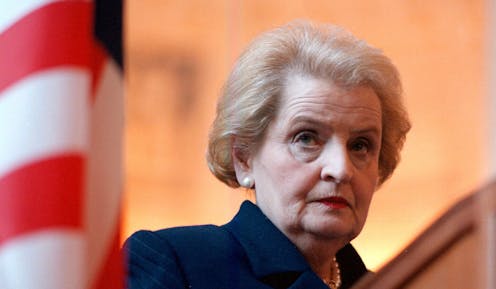Madeleine Albright saw US as an ‘indispensable nation’ and NATO expansion eastward as essential
- Written by Peter Harris, Associate Professor of Political Science, Colorado State University

Madeleine Albright may have not coined[1] the phrase “indispensable nation,” but she will always be associated[2] with the concept.
By the time she became Secretary of State in 1997, the United States had become a beached superpower. During the Cold War, its forces had been deployed across the world for the explicit purpose of deterring Soviet aggression. When the Soviet Union disappeared in 1991[3], so did the primary justification for America’s enormous troop presence abroad[4] and globe-spanning web of military alliances.
The Czech-born Albright, who died on March 23 at age 84[5], helped the United States to conjure a new rationale for its militarized global role in the post-Cold War era.
Her trenchant belief[6] that America was indispensable to global peace and progress led Albright to support military action against Iraq[7] in 1998 and Serbia[8] in 1999. It would be Albright’s lasting regret[9] that the U.S. failed to intervene in Rwanda in 1994 and stop the slaughter[10].
Albright left public office in January 2001[11]. But her basic conviction – that warfighting, when done by the United States, could be a progressive and even altruistic act – has persisted in the corridors of Washington.
It has given leaders of both parties a rhetorical tool to justify interventionist foreign policies even when calls for restraint and retrenchment have been strong.
NATO expansion
One of Albright’s most consequential acts – both as Ambassador to the United Nations from 1993 to 1997 and as Secretary of State under President Bill Clinton – was to support[12] NATO expansion.
NATO had been a cornerstone of the Cold War security order in Europe, binding the United States to the defense of Western Europe. Albright’s approach was to cast NATO not just as a military alliance but as a pillar of international stability and an engine of democratic progress[14]. She saw the alliance as a conduit through which the United States could impart peace, order and good governance upon a fragile European continent.
At the time, critics cautioned[15] that NATO enlargement would antagonize a post-Soviet Russia and could end up worsening the European security order.
Albright’s answer was uncompromising.
“We do not need Russia to agree to enlargement,” she assured senators[16] in 1997, stressing the word “need.”
The strategic and moral case for enlargement was overwhelming, explained Albright. If the newly democratized states of Central and Eastern Europe craved the protection of the United States, she concluded, then no other nation should be allowed to stand in the way.
These arguments prevailed in Washington and other NATO capitals. In July 1997, Poland, Hungary and the Czech Republic were formally invited to join NATO. They were accepted into the alliance in 1999 – the first, but not the last[17], former Eastern Bloc nations accepted into the alliance.
A woman of her times
In hindsight, Albright’s curt dismissal of Russia’s security concerns might seem to have been ill-judged. This is especially true in light of Russia’s invasion of Ukraine, which some analysts blame[18] in part upon the speed and perceived recklessness of NATO expansion during the 1990s.
The advisability of NATO enlargement will be hotly debated for years to come and Albright’s role in the process should not be spared scrutiny. But at the same time, it must be remembered that Albright was a woman of her times; the high points of her career during the Clinton Administration coincided with the pinnacle of American power.
Indeed, it is no exaggeration to say that, during the 1990s, Albright’s job was to help conduct the foreign relations of the most powerful country in the history of the world. It is understandable, perhaps, that she wanted to harness this awesome power toward causes such as nurturing freedom and democracy in countries that had struggled for decades to rid themselves of authoritarianism.
The future of the indispensable nation
Albright lived to see five presidents govern in accordance with her own ideas about America’s special purpose. Even Donald Trump at times[20] betrayed an underlying attachment to the logic of U.S. indispensability.
The world today is different from the 1990s, however. Now that rival states are more willing to punch back[21], it is far riskier for U.S. leaders to perform the role of indispensable nation. As President Joe Biden has cautioned, a military intervention against Russia in Ukraine could mean nothing less than World War III[22].
On the death of Madeleine Albright, then, U.S. leaders should also give thought to what sort of ideas should replace her towering precepts for overseas engagement. It is an urgent task.
[Over 150,000 readers rely on The Conversation’s newsletters to understand the world. Sign up today[23].]
References
- ^ coined (foreignpolicy.com)
- ^ associated (1997-2001.state.gov)
- ^ Soviet Union disappeared in 1991 (history.state.gov)
- ^ enormous troop presence abroad (theconversation.com)
- ^ died on March 23 at age 84 (twitter.com)
- ^ trenchant belief (www.wilsoncenter.org)
- ^ Iraq (www.washingtonpost.com)
- ^ Serbia (www.washingtonpost.com)
- ^ lasting regret (www.pbs.org)
- ^ stop the slaughter (www.bbc.com)
- ^ Albright left public office in January 2001 (history.state.gov)
- ^ was to support (www.google.com)
- ^ Jon Levy/AFP via Getty Images (www.gettyimages.com)
- ^ pillar of international stability and an engine of democratic progress (www.econstor.eu)
- ^ critics cautioned (theconversation.com)
- ^ assured senators (1997-2001.state.gov)
- ^ not the last (www.nato.int)
- ^ some analysts blame (www.theguardian.com)
- ^ AP Photo/Mikhail Metzel (newsroom.ap.org)
- ^ at times (www.thenation.com)
- ^ punch back (www.newsweek.com)
- ^ World War III (thehill.com)
- ^ Sign up today (memberservices.theconversation.com)
Authors: Peter Harris, Associate Professor of Political Science, Colorado State University

